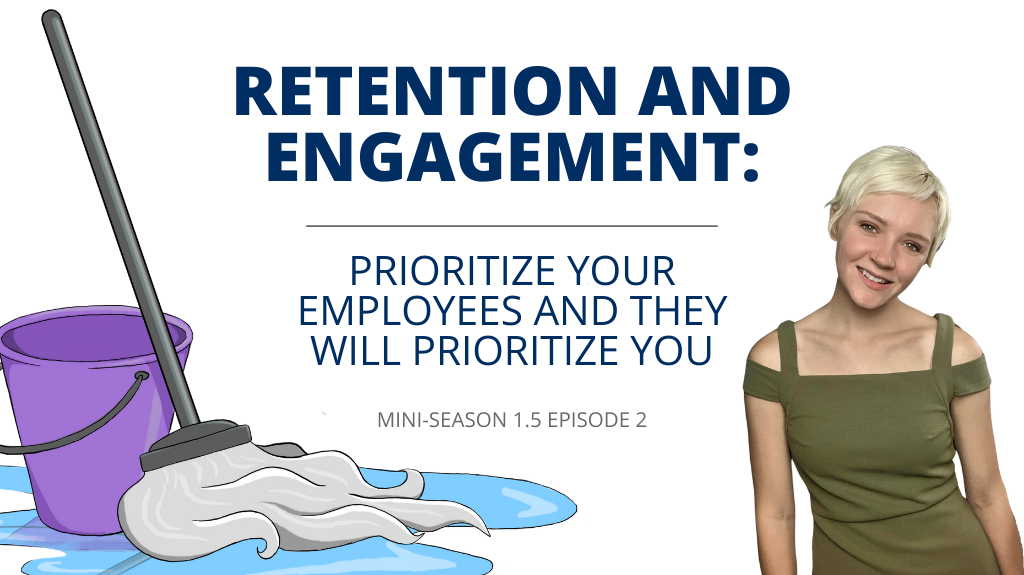Podcast Transcription

Addressing Retention and Engagement
Have you ever worked somewhere that you feel utterly underappreciated or you’re drowning in work while managers don’t seem to care enough? Have you had a bad boss? Been completely over your head and you know all you need is a little bit of training to make it work?
You are not alone.
Now, if you’re the owner or a person sitting in the leadership chair right now, I want you to think long and hard about your worst employment experiences. What would have made a world of a difference in those situations?
That’s what we’re addressing in this week’s episode for The Business of Cleaning podcast.
A huge problem that leads to low retention rates and a heavy lack of engagement is the cogs in a machine approach that kicks in when things get busy or our leaders’ priorities are a little off the mark.
Of course, you’re not in the business of being the best employer on the face of the planet, but when you create a business, you are unwittingly signing up to be a good one or to fail. A good business owner knows that his business will thrive if his employees are happy and eager to work.
One way to do that? Prioritize the employee in every single decision you make.
More Non-Work-Based Activities
Before you turn your nose up or walk away thinking you do this, your business doesn’t need, or COVID-19 has taken this out of your hands, stop and think about why people typically enjoy their work (besides just loving the job itself).
They typically enjoy increased satisfaction and motivation when they’re engaged with their team.
If your team is only bonding over projects, those projects will likely eventually become a chore, and the team a source of stress. Why? Because there’s no diversity of bondings and decreased chances to truly get to know each other.
Non-work-based activities offer a much-needed break in routine, greater team bonding opportunities, chances for teams to branch outside of their social circles within the company, and shows that an employer cares about their teams.
Suggestions for During COVID-19 (all are virtual recommendations):
- Trivia Nights/Lunches (Bring out your teams’ inner nerds! These are hugely popular amongst the JM and Double A Solutions teams in particular)
- Coffee Breakout Sessions (grab a coffee or tea and put team members in random breakout circles with a particular topic to guide the conversation)
- Winter Coat/Mitten Drives (Create safe, contact-less drop off point, maybe an internal competition between teams, and real-time updates)
- Jeopardy (Similar to trivia, but have fun finding increasingly difficult questions)
A Well-Rounded Benefits Offering
This one you’ve probably heard a million times and are saying something along the lines of “Duh!” I hope you feel that offering a good benefits package is extremely important when taking care of your employees.
In reality, though, navigating the world of benefits can be tedious and tricky at best. Not all of us have the fortune of having extensive knowledge of them or formal education in regards to studying them. Not only that, but the market for benefits is always shifting and it seems that more and more companies are coming up with creative but hugely helpful packages.
Start simple. Look at what those in your area are doing and what those in the same industry are doing. If your industry is lagging and the local markets are way-pavers, expect to follow the local market and visa versa.
Don’t stop there. Look at employees’ needs directly. Sometimes this means asking what they would like and don’t be afraid to encourage ideas and suggestions from your employees either. I’ve heard many utter the fear that if somebody makes a suggestion and it doesn’t work out that it will just drive up dissatisfaction instead. This is exactly where communication comes into play (listen to or read episode 1 of this series!). Talk to your employees about your decision making while doing it.
Invest in Good Onboarding and Continuous Training
You may be aware, but the “Throw them into the fire” mentality is being quickly overrun across the board but higher investments in training. In the cleaning industry in particular we don’t pull our applicants from a cleaning school, so we need to make sure we get them up to speed with our processes when they start.
Onboarding is a form of communication and it is your next first impression after the interview process. Remember that it’s not just the employee that has to leave a good impression. You do too.
An employee knows within the first day if they’re going to stay until the end of the week and they know within the first week if they’re going to start looking for another job soon or not. This is the time frame in which they are onboarded or begin being onboarded so think seriously about what they need to know and you can make them feel integrated into the work environment.
After that, do not, under any circumstance, leave the training at the 90-day mark or anytime beforehand. If you do not grow your employees, you are actively growing your company. Training those with leadership potential and offer a variety of training on things like process optimization, planning, organization, and cleaning tasks.
Help create and develop career paths for all of your employees, even those who are only planning to stay temporarily. Supporting employees in their goals makes them feel extremely appreciated and the best publicity you will ever have is through your employees. They are your first line of brand ambassadors and the ones whose voices matter most. Even if they leave after a year or two to move into a different industry or job, it could be your company that they continue to mention as the years go by. Make what they have to say favorable.
Remember the Human Touch
There is nothing quite so toxic in the way a bad and unsympathetic boss can be. As said in the beginning, we’ve all been there and in today’s world, people are less and less willing to put up with it.
Ensure that you and other leaders in your company make good leaders. Look for compassion, relatability, resourcefulness, and the ability to lead a call to action.
On top of having good leaders (which we’re going to address in greater detail later this month!), make sure that you have the policies and follow-through in place to encourage and benefit employees. Policies aren’t just there to make things work or protect you from legal ramifications should you upset someone.
Use your policies to show support for your teams and create stability. For example, scheduling policies have a large impact on the day-to-day. If your company boasts scheduling flexibility at all in the applicant and interviewing process make sure you practice what you preach.
Not only that but clearly define what flexibility means to you in the beginning. Part of what makes communication in that stage great is that, while you may not attract the most desirable, high performer out there, you are going to attract the people that fit your company and want to be there. At the end of the day, that’s what will give your company the competitive edge and put your level of service above the rest!

